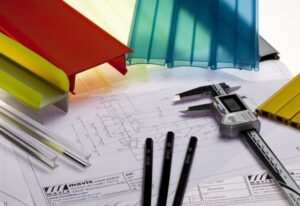The realization of customized plastic profiles begins with an in‑depth analysis of the client’s requirements. During this phase, our team of engineers engages directly with the client to understand:
-
Technical specifications: the functionality of the component, mechanical strength (including compression, tension, bending, shear, and torsion resistance), dimensional tolerances, couplings with other components, and any potential interferences or clearances.
-
Aesthetic considerations: the choice of transparency or color, surface finish (glossy or matte), and the possibility for painting or hot‑stamp embellishments.
-
Standards and certifications: compliance with UNI, CEI directives, and any industry‑specific regulations.
-
Usage conditions: exposure to UV rays, extreme temperatures, or additional processing needs (e.g., drilling, shearing).
This initial dialogue is essential to configure a tailor‑made plastic profile capable of meeting all the durability and performance expectations demanded by the technical‑industrial market.
Selection of the most suitable plastic materials for technical applications
Choosing the appropriate materials is crucial for optimizing plastic profiles. Based on the required properties, we select materials by considering:
-
Mechanical strength: the ability to withstand stress and impacts.
-
Hardness: evaluation of various Shore hardness grades of polymers.
-
Flexibility and adaptability: the need to create products with complex geometries.
- Thermal and chemical resistance: consideration of operating temperatures, resistance to high or low temperatures, and exposure to corrosive substances.
-
Environmental considerations: recyclability and sustainability of the material at end‑of‑life.
-
Aesthetic aspect: selecting between transparent, colored, glossy, or matte materials, and determining whether the material should be painted or processed with heat‑stamped designs.
-
Product cost: performing a cost‑benefit analysis relative to the chosen polymer.
In this phase, both traditional plastics and new engineered plastics are evaluated, including biopolymers and recycled plastics, to ensure the optimal solution for every custom plastic profile.
Techniques for manufacturing customized plastic profiles
The production of customized plastic profiles is achieved through various manufacturing techniques chosen based on the shape, quantity, and type of polymer to be processed:
-
Extrusion, co‑extrusion, and post‑co‑extrusion:
-
The process starts with granulated material that is melted and pushed through a die, which imprints the desired shape, followed by rapid cooling.
-
Ideal for products with a uniform cross‑section, such as tubes, bars, and seals.
-
Allows for high‑volume production at controlled costs by using the same mold for variable lengths (up to 12 meters).
-
Co-extrusion offers the possibility to combine two or more materials (even with different hardness levels) within the same extruded profile, incorporating metal inserts, wires, magnets, etc.
-
Additional operations such as drilling, cutting, embossing, applying double‑sided tape, and printing identification codes can be integrated during the extrusion process.
-
-
Injection molding:
-
Granulated material is melted and injected into a mold, where it solidifies upon cooling.
-
Suitable for producing complex and detailed geometries (e.g., automotive headlamp components) with excellent surface finish.
-
-
Thermoforming:
-
Starting with a plastic sheet that, after heating, is transformed into a three‑dimensional object using a mold.
-
Suitable for producing large‑format pieces in low volumes with reduced tooling costs (e.g., trays or packaging bins).
-
-
3D printing:
-
Extremely useful for prototyping and validating designs before entering full‑scale industrial production.
-
These techniques, often integrated with subsequent processes (such as drilling, shearing, and hot bending), allow for the ultimate customization of plastic profiles.
Advantages of custom plastic profiles in technical applications
The co‑design process between our technical office and the client offers numerous benefits:
-
Performance optimization: Custom‑designed profiles are integrated seamlessly with other components, ensuring optimal technical results.
-
Production efficiency: Tailored processes reduce waste and optimize manufacturing cycles both during extrusion and assembly, enabling efficient mass production.
-
Rapid prototyping: The ability to produce 3D prototypes allows for testing and validation of the design prior to final production.
-
Complete integration: Co‑design facilitates the integration of the profile into more complex systems, tailoring every aspect according to the client’s precise requirements.
“The customization of plastic profiles not only enhances product performance but also optimizes the entire production process, creating bespoke solutions for every technical application.”
Successful cases in customizing plastic profiles
Numerous successful projects highlight the effectiveness of our customization methodology:
-
Automotive sector: Replacing aluminum extrusions with lightweight plastic profiles to reduce vehicle weight, improve energy efficiency, and cut emissions.
-
Co‑extruded solutions: Producing profiles combining rigid and flexible materials to ensure thermal and acoustic insulation in glazing systems.
-
Lighting sector: Creating co‑extruded LED covers that provide high IP protection and insulation while optimizing both design and functionality.
-
Cost reduction: Designing molded profiles to replace wooden profiles, reducing costs while enhancing mechanical strength.
-
Bicycle sector: Utilizing molded plastic for bicycle fenders to reduce weight and production costs.
-
Carbon footprint reduction: Producing custom plastic profiles with specific design features that allow the use of recycled plastics instead of virgin materials.
-
Biodegradable plastic: Replacing conventional plastics with biodegradable options to meet new environmental regulations.
Are you looking to customize your plastic profiles?
If you are seeking innovative solutions for plastic profiles customized for technical applications, Mavis is the ideal partner for you.
Complete the form on our website to receive a free consultation and a tailor‑made quote.



